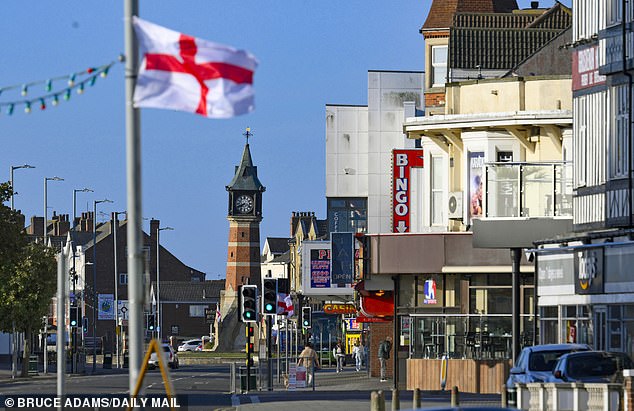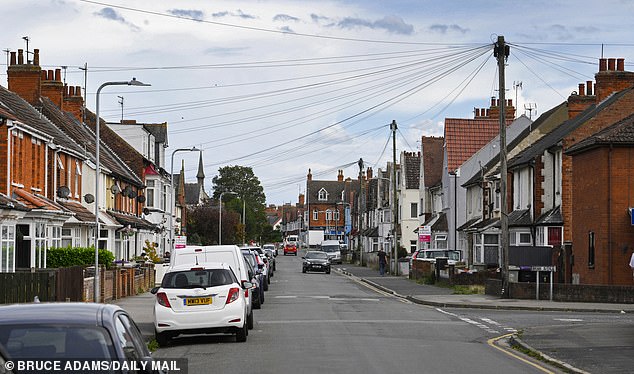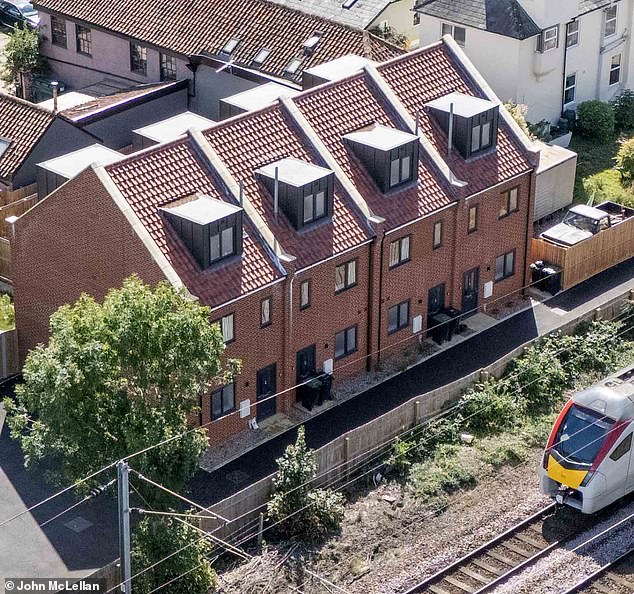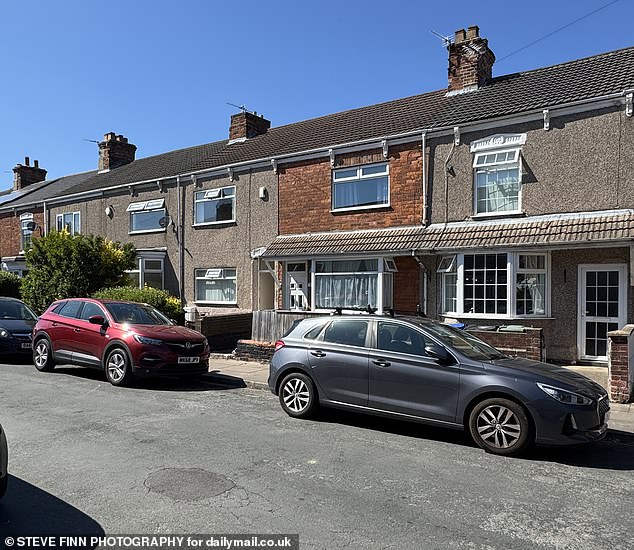A handsome six-bedroom house on a Birmingham street is the centrepiece of a property developer’s glossy sales brochure.
It shows impressive before and after photos of the family home which has been transformed into what it openly declares is an ‘asylum seekers’ haven’.
Since being repurposed, the property has doubled in value to £250,000.
It has been leased to the Home Office for seven years in a juicy deal guaranteeing a private landlord £2,000 rent per month, with all repairs covered.
‘This has maximised the earning potential and ensured a stable, long-term income,’ states the brochure of the developer, which turns family homes into houses in multi-occupation (HMOs) to feed Britain’s insatiable market for migrant accommodation.
Every asylum seeker is given a roof over their heads and there have been north of 50,000 arrivals by boat since Labour took office, with a near daily record of 1,097 in 17 dinghies across the Channel last Saturday and more since then. The conundrum is where to put these often-illegal newcomers.
In addition to them, there are the tens of thousands of more deserving Afghan and Ukrainian (and soon to be Gazan) refugees who have been promised resettlement here.
In the face of public outrage over migrant hotels, the Government has promised to shut them all by 2029 and is now beginning to do so. A controversial plan, dubbed Operation Scatter by critics, is under way to transfer the new faces into private accommodation across the country.

Abdul, from Afghanistan, pictured with Sue Reid inside his HMO, of which there is room for four occupants in Grimsby, Lincolnshire

A property developer in the nearby seaside resort of Skegness has also bought, and refurbished, myriad existing HMOS for migrants
Most of these homes are HMOs, the migrant housing staple considered most suitable for a group of single men of different nationalities who want individual bedrooms.
In what smacks of deep unfairness to many, the Operation Scatter is going ahead as 1.4 million people languish, sometimes for as long as 15 years, on waiting lists for council and social housing in England and Wales.
The Home Office has refused to tell the Daily Mail how many HMOs for migrants it has on the books or how many it will need in the future.
What we do know, however, is that only 30,000 or so of approximately 110,000 in the asylum system remain in hotels, according to recent analysis by Oxford University’s Migration Observatory.
So where are the rest? The answer is in around 100 villages, towns and cities across the country – from North to South, East to West. Our map, compiled from land registry records, local council meeting reports and private property sales data, shows that already barely any part of England is untouched by migrant housing.
This week the BBC delved into the problem by going to the Lancashire town of Wigan, which has recently clamped down on the huge number of HMOs there, many of them for asylum seekers.
Despite having a housing waiting list of 12,000 people, it has 900 HMOs, a 190 per cent increase in four years.
A resident called Adrian stood on his street of red-brick terraces in the town, pointing out migrant houses to the BBC: ‘That’s an HMO, and that’s an HMO… down the street is another HMO.’

Grosvenor Road in Skegness, Lincsolnshire, contains multiple HMO’s housing migrants
He said he had been living nextdoor to one such abode housing asylum seekers. ‘I’ve had intimidation, confrontations in the street,’ he said, as he showed photos from a year ago of young men dressed as delivery drivers coming in and out the house even though asylum seekers are not allowed to work.
The migrants in Wigan, a once-proud cotton town, were placed there by Serco, one of three giant Home Office accommodation providers, the others being Mears Group plc and Clearsprings Ready Homes.
Serco told the BBC it was not responsible for the behaviour of migrants in the community, saying that was a matter for the police or the Government.
But, as Adrian complained: ‘We were never asked, never consulted. They [Serco] just moved them in at 2pm one afternoon. The only reason I knew about it was the voices, screaming and shouting next door.’
Serco is at the heart of the migrant home property bonanza. It offers landlords lucrative five-year tenancies to house them in swathes of the North West, the Midlands and the East of England.
It guarantees rental income during the five-year period with no ‘voids’ or empty buildings, as well as free management, covering all repairs and council tax. It drums up business through a special helpline where landlords can get in touch to see if their home is suitable for migrants.
The result of Operation Scatter is that purchase prices for HMOs are soaring outside London (where hotels still house 60 per cent of migrants) because of demand. The gold rush is particularly evident in poorer areas, such as Blackpool, Bradford and Barrow-in-Furness, where cheap purchase prices give potential landlords a big bang for their bucks.
Recent property data shows there are now 360,000 HMOS in England, and the figure is soaring as landlords take financial advantage of the demand for migrant housing.

The village of Mellis in Suffolk where four new build houses (pictured) have been allocated to asylum seekers situated right next to the railway
Today an HMO sells for an average of £334,260, 13 per cent more than similarly sized family houses in England, and can reap a rental return of an astonishingly high 12.5 per cent.
The Daily Mail has found that the Home Office’s desperate search has specifically targeted HMO properties in often deprived parts of the east coast of England.
In Grimsby, the once-thriving fishing port, a terraced house was recently revamped as an HMO to provide four bedrooms, including one on the ground floor. We talked to two Afghanis and a Yemeni who have moved in courtesy of the Government.
They were pleased to get the rent-free accommodation. One had come in on a Channel boat late last year, another moved from a hotel.
A property developer in the nearby seaside resort of Skegness has also bought, and refurbished, myriad existing HMOS for migrants.
The properties once provided cheap £400 to £500-a-month bedsits for locals working in the tourist trade, shops and the NHS. No longer. We found three HMOs on one side of a terraced street there housing 21 young Somalian, Afghan and African asylum seekers.
Meanwhile, with the help of government grants, an East Sussex council has bought two new-builds on a private estate – at the hefty price of £450,000 and £325,000 apiece – for large Afghan refugee contingents. It means they are off-limits to British families who might have fancied them.
And in a Suffolk village – to the outrage of some locals – four £300,000 houses have been taken by Serco for migrants, thereby shutting out anyone else who might have fancied buying or renting them on the open market.

This HMO is a residential street in Grimsby is being used to house three migrants
In the Basildon town of Essex, Labour councillors have had enough of HMOs and Operation Scatter. They say local residents are being evicted from rental homes by greedy landlords who are increasing their profits by turning properties into migrant housing. ‘It’s enough to make your blood boil,’ said the council’s leader Gavin Callaghan.
Yet Labour ministers have made it crystal clear they expect every part of the country to take their fair share of migrants, whether asylum seekers or refugees. The Oxford University Migration Observatory found in March this year that only 59 of the 361 local authorities in England and Wales have failed to fall in line with this Government diktat.
The truth is the removal of migrants from hotels is having profound and miserable consequences for ordinary people, particularly the young struggling to rent or buy homes.
The winners in this David and Goliath battle will be property developers and private landlords who are enjoying their own housing boom – one which shows no sign of stopping as more and more migrants pour through Britain’s open borders












